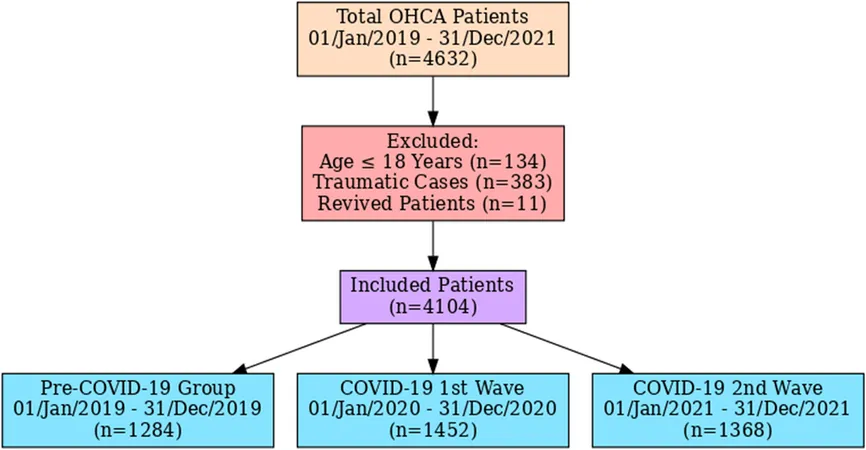
The Alarming Rise of Out-of-Hospital Cardiac Arrests During COVID-19 in Telangana: What You Need to Know
2025-08-21
Author: Jia
A Surging Crisis Amid a Pandemic
In the wake of the COVID-19 outbreak, out-of-hospital cardiac arrest (OHCA) cases have surged in Telangana, India, raising serious concerns about the region's healthcare response and public awareness of lifesaving techniques.
Exploring the Impact of COVID-19 on Cardiac Arrest Rates
A recent retrospective cohort study highlights striking increases in OHCA incidents during the pandemic. In 2020, a staggering 1,452 cases were reported during the first wave alone—over 31% of total cases observed from 2019 to 2021. The second wave saw 1,368 cases, showing that the pandemic's toll on cardiac health is far-reaching.
Dismal CPR Initiation Rates
Perhaps the most alarming finding is the dramatic drop in bystander-initiated Cardiopulmonary Resuscitation (CPR). Before the pandemic, 81.2% of cardiac arrests received CPR within critical minutes. During the first wave, this plunged to just 30.19%. Even in the second wave, the figure rose only to 49.02%—a stark reminder of the need for public training in CPR.
Delays in Emergency Response Undermine Survival Chances
Time is of the essence in emergencies. The study notes a significant increase in the delays in CPR initiation, with over 80% experiencing wait times exceeding 20 minutes during the pandemic. The lack of Return of Spontaneous Circulation (ROSC)—noted at just 0.26% pre-pandemic—skyrocketed to 0% during both waves, showcasing the dire consequences of delayed interventions.
The Dark Context: Struggles in Emergency Medical Services
India’s healthcare system faced overwhelming strain due to COVID-19, leading to delayed emergency responses. Many patients resorted to being transported to hospitals by family members or basic ambulance services, lacking proper prehospital care. This resulted in many cases of OHCA being managed poorly, revealing the critical gaps in emergency medical services.
A Call to Action: The Need for Awareness and Training
The study underscores the urgent need for community awareness programs focusing on CPR and automated external defibrillator (AED) use. The pandemic has highlighted severe deficiencies in public health preparedness for cardiac emergencies, emphasizing that improved training and faster emergency responses are essential to enhance survival rates.
Looking Forward: Reinforcing Community Health Education
As the pandemic reshapes health responses, investing in public education on heart health, CPR training, and accessible AEDs is crucial. This will substantially prepare communities for future health crises and empower individuals to act decisively in critical moments.

 Brasil (PT)
Brasil (PT)
 Canada (EN)
Canada (EN)
 Chile (ES)
Chile (ES)
 Česko (CS)
Česko (CS)
 대한민국 (KO)
대한민국 (KO)
 España (ES)
España (ES)
 France (FR)
France (FR)
 Hong Kong (EN)
Hong Kong (EN)
 Italia (IT)
Italia (IT)
 日本 (JA)
日本 (JA)
 Magyarország (HU)
Magyarország (HU)
 Norge (NO)
Norge (NO)
 Polska (PL)
Polska (PL)
 Schweiz (DE)
Schweiz (DE)
 Singapore (EN)
Singapore (EN)
 Sverige (SV)
Sverige (SV)
 Suomi (FI)
Suomi (FI)
 Türkiye (TR)
Türkiye (TR)
 الإمارات العربية المتحدة (AR)
الإمارات العربية المتحدة (AR)